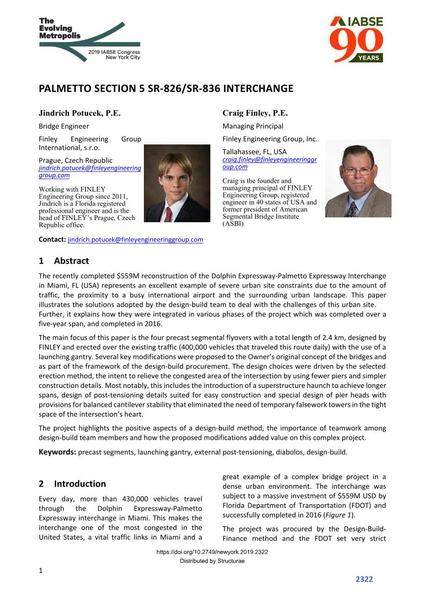Palmetto Section 5 SR-826/SR-836 Interchange

|
|
|||||||||||
Bibliografische Angaben
| Autor(en): |
Jindrich Potucek
(Finley Engineering Group International, s.r.o.)
Craig Finley (Finley Engineering Group, Inc.) |
||||
|---|---|---|---|---|---|
| Medium: | Tagungsbeitrag | ||||
| Sprache(n): | Englisch | ||||
| Tagung: | IABSE Congress: The Evolving Metropolis, New York, NY, USA, 4-6 September 2019 | ||||
| Veröffentlicht in: | The Evolving Metropolis | ||||
|
|||||
| Seite(n): | 2322-2328 | ||||
| Anzahl der Seiten (im PDF): | 7 | ||||
| DOI: | 10.2749/newyork.2019.2322 | ||||
| Abstrakt: |
The recently completed $559M reconstruction of the Dolphin Expressway‐Palmetto Expressway Interchange in Miami, FL (USA) represents an excellent example of severe urban site constraints due to the amount of traffic, the proximity to a busy international airport and the surrounding urban landscape. This paper illustrates the solutions adopted by the design‐build team to deal with the challenges of this urban site. Further, it explains how they were integrated in various phases of the project which was completed over a five‐year span, and completed in 2016. The main focus of this paper is the four precast segmental flyovers with a total length of 2.4 km, designed by FINLEY and erected over the existing traffic (400,000 vehicles that traveled this route daily) with the use of a launching gantry. Several key modifications were proposed to the Owner’s original concept of the bridges and as part of the framework of the design‐build procurement. The design choices were driven by the selected erection method, the intent to relieve the congested area of the intersection by using fewer piers and simpler construction details. Most notably, this includes the introduction of a superstructure haunch to achieve longer spans, design of post‐tensioning details suited for easy construction and special design of pier heads with provisions for balanced cantilever stability that eliminated the need of temporary falsework towers in the tight space of the intersection’s heart. The project highlights the positive aspects of a design‐build method, the importance of teamwork among design‐build team members and how the proposed modifications added value on this complex project. |
||||
| Stichwörter: |
Vorschubrüstung
|
||||
